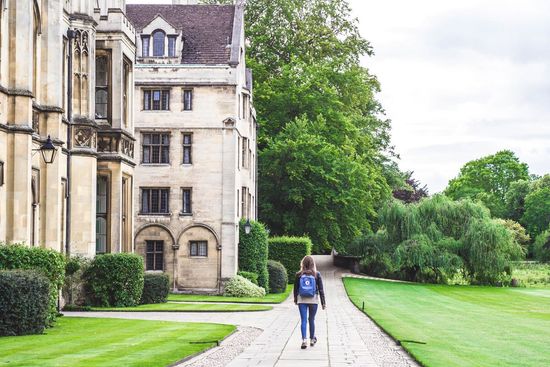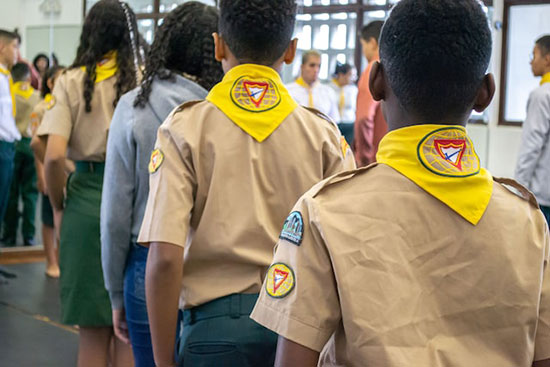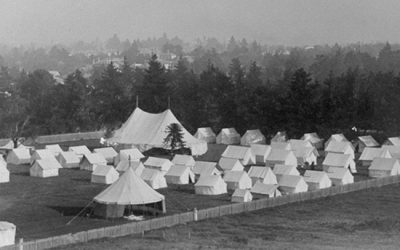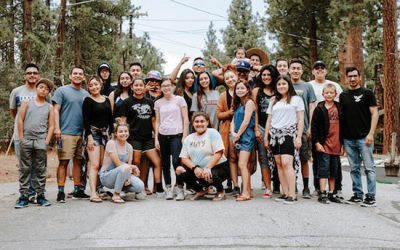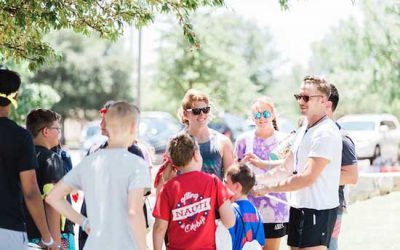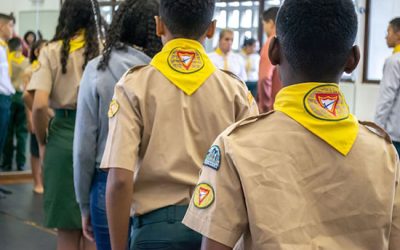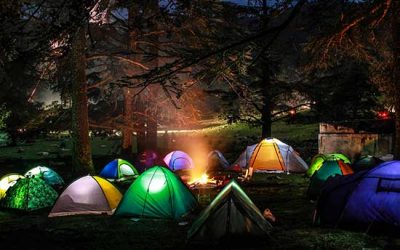Children’s Sabbath School is a Bible program offered every Sabbath at Adventist churches for children from birth to age 18. These classes give children the chance to learn Bible stories, make new friends, and participate in fun activities.
And most importantly, they offer age-appropriate curriculums to teach children what it means to follow Jesus Christ.
Follow along as we show you:
- What children’s Sabbath School classes are like
- What programs are used for Sabbath School
- What makes Sabbath School so important
What are children’s Sabbath School classes like?
Similar to the adult Sabbath School, children’s Sabbath School classes take place in many Adventist churches every Sabbath. The classes typically start at 9:30 a.m. before the church worship service, and they are designed with lessons and activities based on the age of the students.
However, small churches may combine age groups together if they don’t have enough students or teachers. For example, the cradle roll class (infants to two-year-olds) might be combined with kindergarten (three to four-year-olds), and the earliteen class might be combined with the teen class to create a bigger group.
In general, younger students learn Bible stories through interactive activities like songs and crafts. Older students, on the other hand, learn about the Bible and its practical applications through discussion.
Let’s get a tour of each class, starting with cradle roll.
Beginner/cradle roll
As you enter this class, you’ll see young babies and toddlers up to two years old, listening to their teachers tell Bible stories.
During the program, teachers will lead the kids in Bible songs and activities that relate to and illustrate their Bible lesson. They might interact with puppets, earn stickers for repeating memory verses, or enjoy a Bible-themed snack (like animal crackers for Noah’s ark).
Through all the fun and singing, the children are left with one overarching message—that they have a Savior and God who loves them!
Kindergarten
Kindergarten is for children ages three to four. In this class, they sing with their teachers and participate in even more Bible activities. You may see teachers illustrating the weekly Bible story with felt characters and scenery.
Through the lessons, the children learn how much Jesus loves them and what it means to love others too.
Primary
If you head into the primary Sabbath School class, you’ll see elementary-aged children (five to nine years old). The students will sing and enjoy interactive activities about Jesus, as in the other classes for younger children.
By this age, they’ll also do more complex activities like making crafts to illustrate the day’s lesson. For example, they might use playdough and popsicle sticks to recreate Bible scenes from the stories of Noah’s ark or David and Goliath.
Junior
By now, we’re getting to the classrooms with the older kids. Here, you’ll see ten- to twelve-year-olds discussing their lesson with their teachers.
Though they don’t have as many hands-on activities as earlier classes, the juniors still enjoy learning from object lessons, puzzles, and other brain teasers as they grow in their relationship with Jesus.
Earliteen
In this classroom, you’ll meet a group of young teenagers, ages 13 to 14. You’ll listen in as they look up Bible passages, review the lesson from the week, and learn object lessons from history, science, and nonfiction stories.
The programs for this age group are geared to help the students make good decisions and live Christ-centered lives.
Teen/youth
At last, you’ll enter the final classroom on our tour—the class for high school students, ages 15 to 18. Here, the teacher leads the students in a deeper discussion of the Bible and directs them to verses that apply to the particular lesson.
Don’t be surprised if you hear the students ask a lot of questions.
It’s in this class that they are really encouraged to dig deep and ask tough questions about the Bible and how it relates to their lives.
What programs are used to teach Sabbath School?

Photo by Mikhail Nilov
Most Sabbath Schools use the Children’s Sabbath School lessons produced by the administrative body of the Seventh-day Adventist Church—the General Conference.
However, these lessons aren’t the only options for teachers. Some teachers choose lessons that have been produced by independent ministries or individual churches. Others may simply customize the General Conference’s lessons to fit their students’ needs.
The overall goal is to use lessons that are relevant, Bible-based, and engaging for the students.
Typically, local churches purchase the lessons and provide them to the students for free. The students may take the lessons home so that they can prepare for their lesson throughout the week by:
- Memorizing the memory verse
- Reading the lesson
- Doing the lesson’s daily activities
Interested in accessing the Sabbath School programs for yourself?
You can:
- Download the Sabbath School & PM app from the Apple App Store or Google Play.
or
- Visit the children’s Sabbath School’s official website to download the lessons for free.
You can find the lessons in a variety of languages: English, Spanish, French, Chinese, and many more.
Who teaches children’s Sabbath School?
Sabbath School teachers are chosen by the local church’s Sabbath School council, typically based on their ability and enthusiasm to teach children about the Bible.1
But before they can teach, the church requires them to2:
- Complete child-safety verifications
- Get a background check
We also encourage our teachers to go through teaching training courses.3 This way, they can learn methods to make Sabbath School more engaging.
What makes children’s Sabbath School so important?
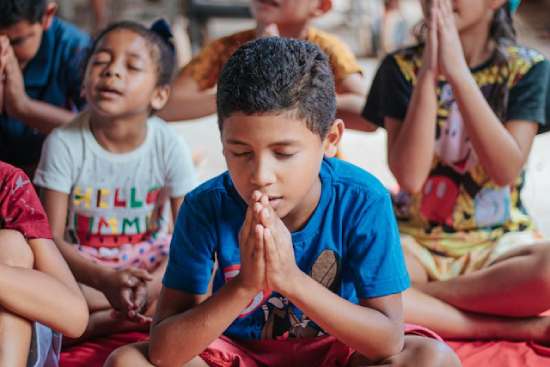
Photo by Carlos Magno on Unsplash
Children’s Sabbath School helps children learn about Jesus and the Bible. It makes attending church a positive experience for them and gives them something they can understand and relate to.
Back before children’s Sabbath Schools existed, Adventist church leader James White recognized the need for some kind of biblical instruction for children.4 That spurred him to publish a paper called the Youth’s Instructor.5 This paper featured some lessons Bible class teachers could use to instruct children.
But these articles weren’t specifically for Sabbath School, and they didn’t always address children’s learning needs.6
The first lessons designed for children came about in 1863 when a woman named Adelia Pataten wrote children’s lessons in the Youth’s Instructor. From there, Goodloe Harper Bell, an Adventist school teacher, created more Bible lessons in 1869, dividing them into age categories—one for children and one for youth.7
Although the lessons had been available for years, official classes weren’t started until 1878, when the General Conference created the General Sabbath School Association to oversee and organize Sabbath Schools across North America.8
And eventually, as the Adventist church’s reach grew bigger, Sabbath Schools spread to churches across the world.9
Though this children’s ministries project began as an attempt to teach children about the Bible, it has become so much more. Children’s Sabbath School’s mission is to give children the opportunity to10:
- Study the Bible
- Enjoy Christian fellowship
- Take part in community outreach
- Support world missions and evangelism through Sabbath School offerings
Sabbath School programs have helped generations of children learn about the Bible, serve their community, and grow in their relationship with Jesus while they make friends and enjoy fun activities.
Are you interested in bringing your kids or grandkids to Sabbath School?
At your local Adventist Church, ask the greeters at the church doors where the children’s classes are. They’ll gladly help you find the right classroom.
Never been to an Adventist Church before? Get a sneak peek of what it’s like by reading
Children’s Sabbath School Resources
Related pages
- Seventh-day Adventist Church Manual, 19th Edition, p. 99. [↵]
- Ibid. [↵]
- Ibid. [↵]
- Kuntaraf, Jonathan Oey, “Sabbath School Personal Ministries Department, General Conference of Seventh-day Adventists,” Encyclopedia of Seventh-day Adventists. [↵]
- The Youth’s Instructor. [↵]
- Kuntaraf. [↵]
- Ibid. [↵]
- Ibid. [↵]
- Ibid. [↵]
- Ibid. [↵]
More Answers
How Do Adventists Make Movie and Music Choices?
How do Adventists decide what music to listen to and which movies to watch? Learn how Bible principles can help us make better entertainment choices.
Does the Seventh-day Adventist Church Believe in Paying Tithe?
Seventh-day Adventists believe in paying tithe and offerings based on the biblical command and our commitment to being wise stewards of God’s resources. These donations help fund the mission of the Adventist Church by supporting pastors, missionaries, church expenses, and evangelistic projects, among other things.
Seventh-day Adventist World Population and Demographics
The Adventist Church has more than 22 million members and 100,000 churches worldwide, plus a large system of hospitals, schools, and publishing houses. Learn more about this diverse church.
What Is a Seventh-day Adventist Camp Meeting?
Although camp meetings didn’t begin with the Seventh-day Adventist Church, they’re as much an Adventist thing as haystacks.
Camp meeting is an extended event for Adventists (and non-Adventists) of all ages to gather and participate in spiritual seminars and activities. During the event, attendees often camp in tents, campers, or RVs.
How to Join the Seventh-day Adventist Church
Whether you heard about the Seventh-day Adventist Church through a traveling evangelist, during your online searches, or through a loved one or relative, you might be considering joining yourself.
How Do Adventists Do Baby Dedications?
For Christians, dedication ceremonies for babies, also for older children, are an important time for parents and the church. It’s a special part of the worship service when parents present their young children to God and the church family. Both parents, along with the congregation, regard this as a solemn promise to be a Christ-like example to the child.
Do Adventists Celebrate Communion and Foot Washing?
Like many Christian denominations, Adventists regularly participate in communion, also referred to as the “Lord’s Supper” or the “Last Supper.” They also practice foot washing (John 13:1-20), or the “ordinance of humility,” during the service—which isn’t as common.
What is the Concept of “Present Truth” and Why is it Important?
Present truth is the principle that certain biblical truths are relevant to God’s people at specific times in history. God sends the Holy Spirit to reveal truths that help us better understand how to interpret and apply His Word in a present moment.
Do Seventh-day Adventists Celebrate Easter
Yes, many Seventh-day Adventists do celebrate Easter.
Does the Adventist Church Have Youth Ministry Programs?
The Seventh-day Adventist Church has been organizing and operating youth ministry programs since 1879.
In our opinion, youth ministry is one of the most important ministries a church can have.
Do Adventists Celebrate Birthdays?
Yes, most Seventh-day Adventists do celebrate birthdays because we see them as excellent reminders of the life God has blessed us with. And we celebrate them the same way everyone else does—with friends, family, presents, and a special meal.
Sola Scriptura—What It Means and Why It Matters
Sola scriptura is a term that originated during the Protestant Reformation. It represents the way many Christians view the Bible and its authority. While the idea is simple enough, there is so much more to sola scriptura than its basic definition.
What Do Adventists Offer for Young Adults?
In recent years, the age group often classified as “young adults” has been trickier to engage. It’s been a significant concern for Christian churches around the world. Though interestingly enough, similar observations regarding young adults have been coming up in conversations about the economy, the entertainment industry, politics, and more.
Do I Need to be an Adventist to be Saved?
The answer to this question is simply, “no.”
When it comes to salvation in Jesus Christ, all that is required of a person is to acknowledge Jesus’ sacrifice for us, believe that He has saved us, and claim the free gift of salvation that is always available to us. Salvation is not based on denomination.
Do You Have to Be Vegetarian to Be Adventist?
Of course not. Membership in the Seventh-day Adventist Church has never included any dietary requirements. However, there might be some reasons people might think that. So many Adventists are vegetarians or even vegan, and a plant-based lifestyle has many health benefits.
All About Seventh-day Adventist Colporteurs
The Seventh-day Adventist Church uses a variety of methods to spread the hope of the gospel to the world. One of these ways is through colporteuring, also called “canvassing” or “literature evangelism.”
What Is an Adventist Book Center (ABC)?
When you walk into any one of the many Adventist Book Center (ABC) locations, chances are you’ll be greeted by pleasant gospel music in the background, friendly employees, and row after row of Christian books, movies, Bibles, study guides, kids’ games, and more.
Do Seventh-day Adventists Celebrate Holidays?
Wondering whether your Adventist classmate or coworker keeps the same holidays you do? Perhaps you want to include them in some festivities, but you also want to respect their beliefs. Thus, you’re unsure of how to navigate the holiday question. Will they accept your invitation to the office Christmas party?
The Adventist Haystack (It’s Not What You Think) + 4 Recipes
Haystacks are basically a taco salad—with an Adventist spin on it! Most versions are vegetarian and offer an endless combination of tasty toppings. We eat them often because they’re healthy, scrumptious, and easy to make.
Do Seventh-day Adventists Believe in Medical Care?
The Seventh-day Adventist Church believes in and supports evidence-based medical care. In fact, medicine has played a significant part in our history, and today we run a major health system with hospitals, medical schools, and clinics throughout the world.
Why do Adventists Emphasize Religious Liberty?
Adventists see religious liberty as an essential human right. After all, God endowed humanity with freedom of choice from the very beginning. So we believe it’s best for governments to also support their citizens’ rights to worship based on their convictions.
All about Adventist Elementary Schools
The Seventh-day Adventist Church operates the largest Protestant education system in the world. A big part of this system is our K-8 elementary schools, or primary schools, as they’re known in other parts of the world.
What Are Pathfinder and Adventurer Clubs?
Like the boy or girl scouts, Pathfinders and Adventurers learn about nature and life skills. But what makes these clubs special is their purpose to bring young people closer to Jesus.
A Look at Adventist Colleges and Universities
On the outside, Seventh-day Adventist universities may not look much different than other college campuses. But the real differences are beneath the surface.
What Is ASI (Adventist-Laymen’s Services and Industries)?
ASI, which stands for Adventist-laymen’s Services and Industries, is a membership-based organization that provides support for Seventh-day Adventist laypeople (Adventist professionals who aren’t pastors).
What Are Adventist Evangelistic Meetings?
The Seventh-day Adventist Church puts a huge emphasis on sharing the gospel through evangelism, or sharing the gospel through preaching, teaching, and testimony. One of the ways we accomplish this is by organizing public events called evangelistic meetings.
Christian Summer Camps—A Cherished Adventist Ministry
School’s out, the sun’s shining, and your kids are thrilled to have the summer ahead of them. Then three days in, you hear, “I’m bored…”
Do Adventists Have Their Own Bible?
Adventists have some unique beliefs—you might be able to name some of them right now. The seventh-day Sabbath. Death as a sleep. Hell as nonexistence.
What Is Vespers?
Friday rolls around, and you’re spending time with your Adventist friends or relatives when they mention they’re going to vespers tonight.
Didn’t find your answer? Ask us!
We understand your concern of having questions but not knowing who to ask—we’ve felt it ourselves. When you’re ready to learn more about Adventists, send us a question! We know a thing or two about Adventists.



